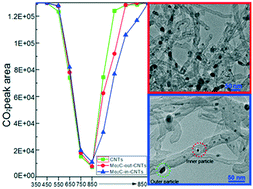Improvement of the catalytic stability of molybdenum carbide via encapsulation within carbon nanotubes in dry methane reforming†
Abstract
We reported for the first time the enhancement of the oxidation resistance of Mo2C nanoparticles by encapsulation within carbon nanotubes (CNTs). The oxidation rate of Mo2C can be reduced significantly by the encapsulated Mo2C in CH4/CO2 reforming, which promoted the catalytic stability of Mo2C. This type of Mo2C/CNTs modified by Ni (Co) showed a high catalytic stability at a high WHSV (18 000 cm3 g−1 h−1) throughout a 50 h period.



 Please wait while we load your content...
Please wait while we load your content...